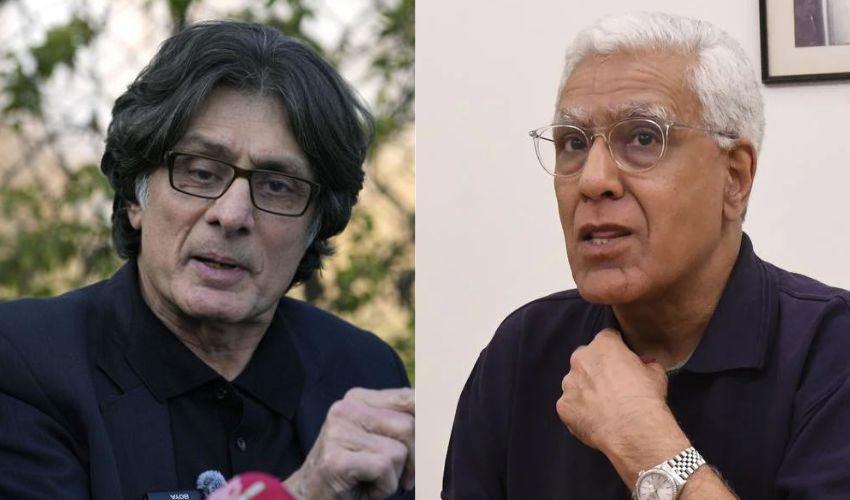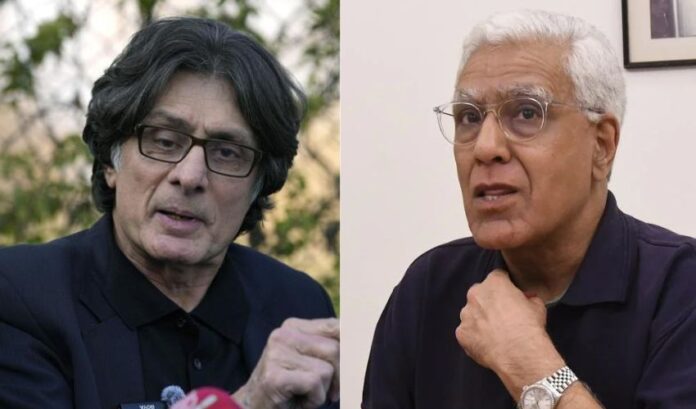Raoof Hasan’s Alleged Contact with Indian Journalist to Promote Anti-Pakistan Army Narrative
Pakistan Tehreek-e-Insaf (PTI) Secretary General Raoof Hasan reportedly maintained regular contact with Indian journalist Karan Thapar through WhatsApp, allegedly urging him to propagate a negative narrative against the Pakistan Army. This communication raises concerns about potential influence and the dissemination of sensitive information.
Initiating Contact: November 2022
On November 19, 2022, while acting as PTI’s media coordinator, Raoof Hasan initiated contact with Indian journalist Karan Thapar through a WhatsApp message. Thapar, known for his critical analysis of South Asian politics, initially inquired about the possibility of an interview with Shah Mehmood Qureshi, a senior PTI leader and former Foreign Minister of Pakistan.
The conversation soon took a different turn. On November 24, 2022, Thapar shared a YouTube link with Hasan, featuring an interview with Rana Banerjee, a former officer of the Indian intelligence agency Research and Analysis Wing (RAW). The interview focused on Pakistan’s then newly-appointed Army Chief, General Asim Munir. During the conversation, Thapar characterized General Munir as a “hardliner for India,” a narrative that seemed to align with a particular anti-Pakistan stance.
Exchanging Information: Sensitive Insights and Reactions
The following day, November 25, 2022, Karan Thapar continued the exchange by sharing an interview with a Pakistani journalist that discussed General Asim Munir’s role and influence within Pakistan’s military establishment. Raoof Hasan’s response was swift and pointed. Dismissing the Pakistani journalist as unreliable, Hasan went further by sharing what is being described as sensitive information about the Army Chief with Thapar.
This act of exchanging sensitive insights, particularly regarding key figures in Pakistan’s military, added a layer of complexity to the communication, suggesting that it was not just an ordinary political discourse but something that potentially compromised national interests.

Criticism of Pakistan’s Foreign Policy: February 2023
In February 2023, the conversation reportedly took a turn towards international politics. Sources confirmed that Raoof Hasan expressed admiration for India’s stance on the Ukraine crisis while vehemently criticizing Pakistan’s position. In a WhatsApp message sent to Karan Thapar, Hasan remarked, “India’s position is understandable in the context of its desire to remain neutral.” He went on to accuse Pakistan of secretly supplying weapons to Ukraine despite abstaining from the United Nations vote on the issue. These comments reflected Hasan’s growing dissatisfaction with Pakistan’s foreign policy direction under the prevailing government, particularly with respect to its military’s covert operations.
Escalation of Rhetoric: March 2023
By March 2023, Hasan’s communication with Thapar escalated to a more provocative tone. He described the arrests of PTI members as acts of “state violence” and warned that Pakistan was “ready for a bloody revolution.” The choice of words signaled a drastic shift in narrative, portraying the country as being on the brink of severe internal turmoil. Hasan’s remarks to Thapar during this period were notably inflammatory, aligning with PTI’s broader stance against the state and its institutions.
Alleged Misinformation: May 2023
In May 2023, Raoof Hasan allegedly misled Karan Thapar with misinformation about the movements of Pakistan Army units. On May 11, 2023, in a WhatsApp message, Hasan claimed that “Pakistan’s streets are witnessing full military mobilization,” further stating that the country was effectively under “an undeclared martial law.” This narrative painted a bleak picture of Pakistan’s internal security situation, suggesting that the country’s military was preparing for a broader crackdown. However, subsequent reports revealed that these claims were exaggerated and did not reflect the true state of affairs in the country.
Urging Negative Narratives Against Pakistan Army
Throughout these communications, one common thread persisted: Raoof Hasan’s alleged encouragement for Karan Thapar to promote negative narratives against the Pakistan Army. Hasan’s repeated efforts to push an anti-military agenda suggest a concerted attempt to shape international perception against Pakistan’s security forces. By leveraging his connections with foreign journalists, Hasan appeared to be attempting to influence external media coverage, which could potentially harm Pakistan’s international reputation.
Conclusion
The ongoing revelations about Raoof Hasan’s alleged communication with Indian journalist Karan Thapar have sparked significant controversy. His purported attempts to share sensitive information and push an anti-Pakistan Army narrative raise questions about PTI’s broader media strategy and its interactions with foreign journalists. The allegations, if true, not only represent a serious breach of national security but also illustrate the lengths to which political actors may go to influence narratives both within and outside Pakistan


